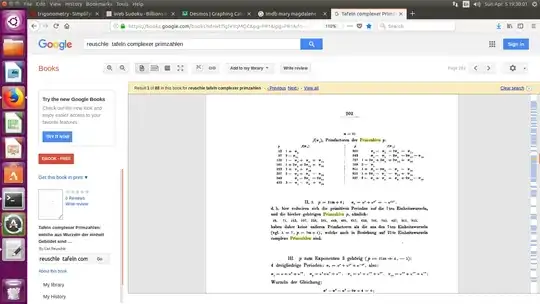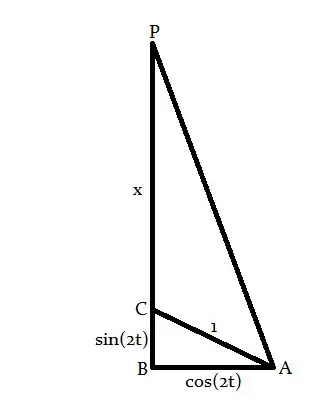Given $$ S = \cos\left(\frac{2 \pi}{21}\right) + \cos\left(\frac{8 \pi}{21}\right) + \cos\left(\frac{10 \pi}{21}\right)$$ then what are some, or at least one, method to reduce this sum? According to Wolfram Alpha/Mathematica $$S = \frac{1 + \sqrt{21}}{4}.$$
Attempt
By using \begin{align} (a + b + c)^3 &= 6 a b c + 3 (a + b + c)(a^2 + b^2 + c^2) - 2 (a^3 + b^3 + c^3) \\ a^2 + b^2 + c^2 &= (a + b + c)^2 - 2 (ab + bc + ca) \\ \cos^3 \theta &= \frac{1}{4} \, ( 3 \cos\theta + \cos(3 \theta)) \end{align} or $$ (a + b + c)^3 = (a^3 + b^3 + c^3) - 3 (a + b + c)(ab + bc + ca) - 3 a b c$$ then $$(\cos x + \cos y + \cos z)^3 - \frac{3}{4} (\cos x + \cos y + \cos z) = \frac{1}{4} (\cos 3x + \cos 3y + \cos 3z) - 3 (\cos x + \cos y + \cos z) (\cos x \cos y + \cos y \cos z + \cos z \cos x) - 3 \cos x \cos y \cos z.$$ If $$ x = \frac{2 \pi}{21} \quad y = \frac{8 \pi}{21} \quad z = \frac{10 \pi}{21}$$ then $$S^3 - \frac{3}{4} \, S = \frac{x}{4} - 3 S \, P - 3 \, \cos\left(\frac{2 \pi}{21}\right) \cos\left(\frac{8 \pi}{21}\right) \cos\left(\frac{10 \pi}{21}\right), $$ where \begin{align} x &= \cos\left(\frac{2 \pi}{7}\right) + \cos\left(\frac{8 \pi}{7}\right) + \cos\left(\frac{10 \pi}{7}\right) \\ &= - \left(\cos\left(\frac{\pi}{7}\right) - \cos\left(\frac{2 \pi}{7}\right) + \cos\left(\frac{3 \pi}{7}\right) \right) \\ P &= \cos\left(\frac{2 \pi}{21}\right) \cos\left(\frac{8 \pi}{21}\right) + \cos\left(\frac{8 \pi}{21}\right) \cos\left(\frac{10 \pi}{21}\right) + \cos\left(\frac{10 \pi}{21}\right) \cos\left(\frac{2 \pi}{21}\right). \end{align}
Since, \begin{align} P &= \cos\left(\frac{2 \pi}{21}\right) \cos\left(\frac{8 \pi}{21}\right) + \cos\left(\frac{8 \pi}{21}\right) \cos\left(\frac{10 \pi}{21}\right) + \cos\left(\frac{10 \pi}{21}\right) \cos\left(\frac{2 \pi}{21}\right) \\ &= \frac{1}{2} \, \left[ \left(\cos\left(\frac{2 \pi}{7}\right) + \cos\left(\frac{4 \pi}{7}\right) + \cos\left(\frac{6 \pi}{7}\right) \right) + \cos\left(\frac{2 \pi}{21}\right) + \cos\left(\frac{8 \pi}{21}\right) + \cos\left(\frac{10 \pi}{21}\right) \right] \\ &= \frac{1}{2} \, \left[ S - \left(\cos\left(\frac{\pi}{7}\right) - \cos\left(\frac{2 \pi}{7}\right) + \cos\left(\frac{3 \pi}{7}\right) \right) \right] \\ &= \frac{1}{2} \, (S + x), \end{align} then $$S^3 + \frac{3}{2} \, S^2 - \frac{3}{4} \, S = \frac{x}{4} - \frac{3 \, x \, S}{4} - 3 \, \cos\left(\frac{2 \pi}{21}\right) \cos\left(\frac{8 \pi}{21}\right) \cos\left(\frac{10 \pi}{21}\right).$$
This seems to be trading one complication for another.
Note The original problem was related to a reduction of $$x = \cos\left(\frac{\pi}{7}\right) + \cos\left(\frac{4 \pi}{7}\right) + \cos\left(\frac{5 \pi}{7}\right)$$ but was in error since, in my notes, I had made a reduction of $\frac{2}{3}$ to each term.

